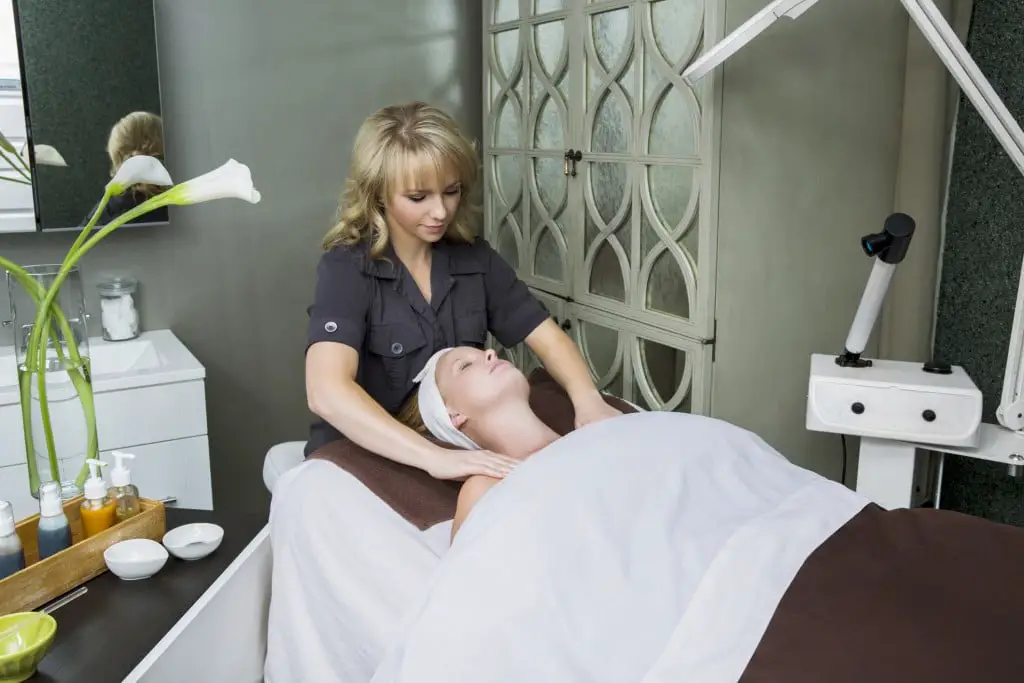
In this 21st century era, every woman is trying to juggle a career, a social life, family as well as maintaining a healthy life.
Most of these white-collar jobs still require you to look the part, which is all a piece of cake until your skin starts to display your busy lifestyle. You don’t have to go to work with a zombie looking sleep-deprived face since aestheticians are here to keep your face looking healthy and fresh at all times.
An esthetician is a skin care specialist who majors in skin beautification. The aesthetics industry is undergoing an explosion of growth thanks to the aging baby boomers, who are more than 60,000 in the United States and the increased disposable income among the Americans.
Legal limitations of estheticians
What can an esthetician do?

Estheticians are skin care therapists who major in skin cosmetic treatments such as waxing, facials, body treatments, and superficial chemical peel. If you need to know your skin type or what products to use on your skin, an esthetician is a go-to person.
They are also trained to combat complexion problems through therapies and other practices. These therapies are specially designed to improve the skin tone, color, texture and the youthfulness of your face and neck as well.
These therapies include body wraps, hair removal as well as sugar and salt scrubs. Their work revolves around lotions, creams, wraps and serums which are made from essential oils, infused scents and botanicals to give every customer a sensory experience which facilitates rejuvenation and relaxation.
They are also allowed to use electrical and mechanical appliances such as brushing machines, atomizers, galvanic current and electric pulverizers to attain the desired effect.
For one to be an Esthetician, with Connecticut’s estheticians as exceptional, he or she must be licensed in most countries. You can find estheticians in skin spas, medi-spas, salons or at dermatology offices.
What estheticians can’t do?
Although medical esthetics is a term thrown around by most practitioners, esthetics is not classified as a medical practice. Estheticians are not certified to treat, diagnose or prescribe any skin diseases or conditions.
Instead, all invasive medical conditions are left sorely to licensed medical experts such as dermatologists. Estheticians are not supposed to administer any forms of injectables including facial or Botox fillers nor apply deep chemical peels on your face.
Procedural expertise
Estheticiansdifferent areas
-
Facials
The facial is the basic treatment for any esthetician. A basic facial contains facial steam, deep cleansing, moisturizing serum, mask, and exfoliating treatment.
One may also be given a facial, shoulder and facial massage as part of this package. Facials are designed to suit every client’s preferences and needs.
-
Acne treatment
Regular esthetic treatment can prevent acne breakouts. Mild acne can be eliminated using over-the-counter acne products as well as through exfoliation procedures. On the other hand, moderate and severe acne should be handled by dermatologists.
-
Extractions
Extraction involves the removal of oil and dead skin cells from the pores. This is usually done to remove non-inflamed breakouts such as blockages and blackheads. When extractions are done, the feel and look of the skin improve automatically.
-
Waxing and hair removal
If you need unwanted hair removed, an esthetician is the right person for that job. They can remove it through threading, laser hair removal, tweezing and waxing.
Estheticians can remove hair from literally anywhere. Surprisingly, they can handle both Brazilian waxing as well as bikini waxing.
-
Makeup application
For that special look on your wedding or prom date, estheticians offer makeup do-overs too. You don’t have to buy a whole makeup kit for that single day while an esthetician can do it for you perfectly from their makeup kits.
Book an appointment early though during busy summer and spring months to avoid delays since they’re booked quickly.
Training and certification
For one to become an esthetician, he or she must complete a one to two months training, depending on a country’s requirement, in an endorsed beauty school. After the training, the candidate is supposed to pass both a practical and a written exam.
The esthetician is then licensed through the health department or the state board of cosmetology. To stay abreast with the current trends in the beauty world, it’s essential for a licensed esthetician to enrol for a post-graduate course in esthetics and even a master’s degree after that.
Skills and attributes
In addition to the skills you get at the formal training center, personal skills and attributes will also help you succeed in this field. Remember, this is a customer service job, and excellent communication skill is very vital.
Each session starts with a chat with your customer to identify what she needs for her skin. Once you have an idea of what she wants, suggest different options and through your discussion come to an amicable solution together on what is to be done. You must be polite, knowledgeable, creative and patient to survive in this business.
Bottom line
Treatments by an esthetician may seem unnecessary sometimes especially in this economic time, but they are for sure the best way to coddle yourself. When done once or twice a week, they can help you in keeping your skin healthier and brighter.
Before reserving your appointment with an esthetician, it’s important to look for a knowledgeable person in the area which is most essential to you at the time and someone you feel comfortable around.






































